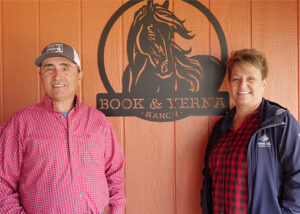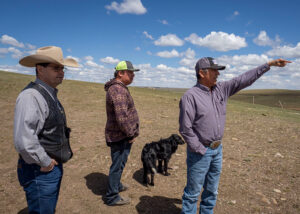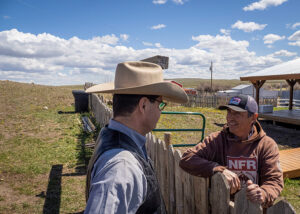
Book St. Goddard and his wife Verna Billedeaux, along with nephew, Jon St. Goddard, raise beef cattle on their ranch on the Blackfeet Indian Reservation. USDA photo.
By Elise Gaboury, Farm Service Agency
It’s time once again for the USDA Farm Service Agency’s annual county committee elections. We’re introducing you to current committee members across the nation throughout the nomination period, which runs now through Aug. 1, 2024. This week, meet Book St. Goddard, member of the Blackfeet Nation in Montana.
Passing Down Traditions
Book St. Goddard is a third-generation rancher raising beef cattle, barley and alfalfa hay on the Blackfeet Indian Reservation in northwestern Montana. Book operates the ranch with his wife Verna Billedeaux and nephew, Jon St. Goddard.
While serving as an educator for Browning Public Schools for 25 years, Book maintained the ranching operation he was born into. His great grandfather started the operation and his father proudly carried on the tradition.
“My father encouraged me to go to school and told me that ranching will always be there for me,” he said. “He laid the foundation, and I just kept it going, growing it little by little. I hope to pass on the traditions.”
Overcoming Challenges
It hasn’t always been easy, as rising costs of leasing land and droughts have been ongoing challenges for Book.
“We crossed our fingers and prayed for rain,” he said.
With a little ingenuity to improve their grazing rotation practices, Book worked hard to mitigate the impact of drought. FSA’s disaster assistance programs, including the Livestock Forage Disaster Program, Emergency Assistance for Livestock, Honey Bees, and Farm-raised Fish, and the Noninsured Crop Disaster Assistance Program, also provided much-needed support.
“There’s programs out there that help you through those tough times. They don’t pay all but it does offset costs – haying costs, fuel costs,” he said. “All you have to do is make the phone call and the doors are open for you.”

FSA Administrator Zach Ducheneaux (left) sees the impact of drought firsthand on Book (right) and Jon’s (middle) ranch. As a county committee member, Book helps ensure other producers know about programs available to help them recover from disasters. Photo by Preston Keres.
Responsibility and Service
Unfortunately, drought has persisted in Glacier County. As a member of his local FSA county committee, Book and his fellow committee members, play an important role in ensuring these programs are being implemented timely and making sure other producers are aware of available assistance.
County committee members are elected by their peers to serve as a direct link between the agricultural community and USDA. Each year, FSA accepts nominations for a certain Local Administrative Area and the LAA up for election rotates each year.
As a member of the Blackfeet Nation, Book encourages other tribal landowners to be involved in their local elections. For purposes of FSA county committee elections, every member of an American Indian tribe is considered an agricultural landowner if the land on which the tribal member’s voting eligibility is based is tribally owned or held in trust by the United States for the tribe, even if the individual does not personally produce a crop or raise livestock on that land.
“What a lot of people don’t understand is you don’t need to be a producer. You don’t even need to own a farm animal or own a tractor. As a tribal landowner, you are eligible to vote,” Book said. “I feel this day and age, voting is critical, not only for boards, but everything, because we need people who will understand us.”

Book, member of the FSA county committee in Glacier County, Montana, visits with FSA Administrator Zach Ducheneaux. Photo by Preston Keres.
Tribal agricultural landowners 18 years and older can contact their local FSA county office to register. After providing FSA your contact information, including a current mailing address, you will be updated as an eligible voter in FSA’s election database.
Book sees his role on the county committee has a big responsibility and a service to his community.
“It has been a positive experience,” he said.
More Information
For more information on FSA county committee elections, contact your local FSA office or visit fsa.usda.gov/elections.
Elise Gaboury is the outreach and public affairs specialist for FSA in Montana.





